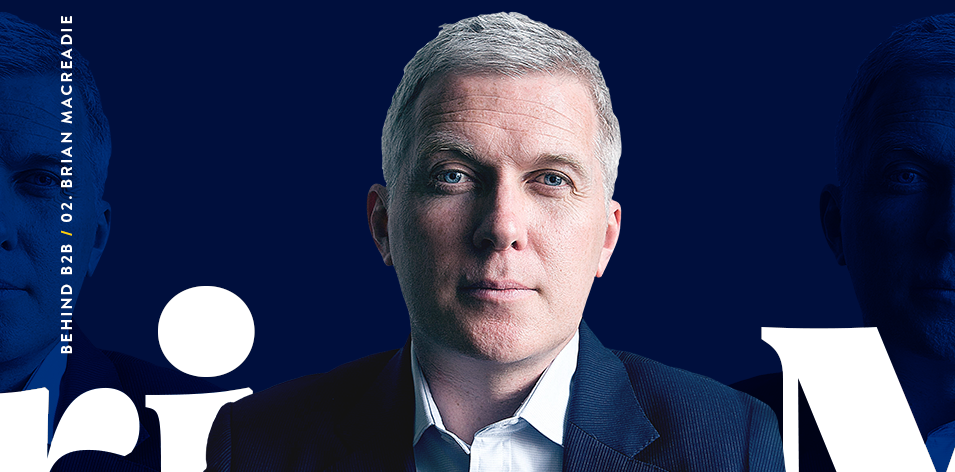

“When I grow up, I want to be a B2B marketer.”
Said no one. Ever.
But now we’re actually here… well, it feels like a pretty good place to be. We’re biased, but we think B2B marketing is having a bit of a moment. We’re slowly breaking free of our old, staid shackles. We’ve got all sorts of swish tools, MarTech and platforms to help us do our jobs.
And best of all? As an industry, we’re producing some really bloody good work.
All of which got us thinking. Who’re the people making great work happen? Who’s driving the charge and championing creativity across the industry? And how on earth did they get here?
We’re keen to find out. So without further ado, meet the second interviewee in our Behind B2B series, Brian Macreadie – B2B marketing evangelist and one-time aspiring astronaut…
Avid LFC supporter, sender of sponge fish, and all-round B2B expert (not to mention winner of more marketing awards than most of us could ever dream of). All of these phrases describe Brian, who can currently be found as Head of Marketing for Addleshaw Goddard.
From strategy to brand, product development to MarTech, Brian’s illustrious career has given him a firm grasp on all things B2B. So we caught up with him to find out how he got here – and to pick his brains about what makes B2B great.
The master plan was actually to become an astronaut! My heroes were Neil Armstrong and Luke Skywalker. And I was absolutely serious about that; I worked my arse off, did a physics degree at Imperial, majored in astrophysics.
Sadly, it turns out not that many people can become astronauts… especially not if you’re a Brit (and you can’t fly a plane). So with my physics knowledge, I ended up in the defence industry, working on all sorts of ‘official secrets act’ stuff.
But this strange thing started happening a few years in: I realised I was better at interacting with clients than coding. I was working at a specialist defence software business – and they started putting me in more and more account meetings and pitch situations.
It struck a chord with me, and I was good at it – so they sent me on some sales and marketing courses because they felt: well, this guy’s doing quite well with the clients.
I did a marketing course with the CIM – and it was literally: bingo, I love this. I’m not an astronaut after all – I’m a B2B marketer! So I decided to change course. Funnily enough, there weren’t many businesses looking to hire a defence software specialist as a marketer, but I was lucky enough to find a role with AT&T and they were prepared to invest in me. Let me develop.
Interestingly, before they let me loose in the marketing team, I had to go off and do time in business analysis and sales. That was a really solid grounding – I still maintain that the best lesson I’ve learnt in my career was just to spend more time with clients. To empathise with them and learn what their worlds are really like. Sometimes, clients seize up when they start to feel marketed to, but if you spend enough time with them, you can focus better on what really matters and speak on a level that resonates.
And also: keep learning in general. Stay curious. I’m a voracious reader – I read everything I can get my hands on. Not just marketing communications, but psychology, strategy, pricing theory, economics. Am I a bit of a geek? Probably, but I think it’s important.
I strive to make everything I do as interesting as possible – that’s where success comes from. Just saying the same stuff, in the same ways… it’s marketing suicide. So be different. In that vein, I’ve initiated Twitter battles between universities, I’ve sent sponge fish to the world’s most prominent telecom buyers.
I once did a campaign where we ‘haunted’ over 300 senior lawyers from the UK’s largest corporations – we invited them to an event, built fake walls, ghouls were grabbing at them, there were dead people in the audience… It sounds gratuitous, but there was a legitimate reason. We were highlighting all of the lingering issues in their business that would come back and haunt them if they weren’t resolved.
But another campaign example I’m proud of was during my time as Marketing Director at Getty Images. That was a phenomenal job to have – they’re the official photographers for the Champions League, the NBA, you name it. I’m a sports fan, so it was a dream job for me.
We had access to the most phenomenal footage and images from sporting history. And we also knew that people, at heart, are nostalgic – especially sports fans. So we did a great American Football campaign using archival footage, featuring the great NFL players of the past. It was brilliant fun, and proved very popular with customers.
I think Microsoft is the gold standard in B2B. They’ve been at the top of their game for years, building long-term customer captivity and barriers to entry. Staying profitable. Hiscox, the insurers, are another fantastic example. They’ve really nailed their market segmentation; entrepreneurs and small businesses are their sweet spot. And all of their communications, products and services get behind that targeting.
They’re not afraid to be emotive, either. They used a brand platform, ‘business insurance for the small and the brave’, that really engaged their audience (and delivered demonstrable results in growth, sales and retention). And that’s clever – because small business and entrepreneurs are emotional about what they’re doing. How could they not be?
B2B marketers are great at tapping into the varied complexities of what motivates buyers. We have to be – we’re helping people make huge decisions in a way that B2C often isn’t.
As for a specific campaign, Hiscox has an insurance product aimed at protecting small businesses and entrepreneurs against the impacts of cyber attacks. These groups often lack the in-house IT capabilities to really robustly protect against these threats. So they set up a digital billboard in Canary Wharf, connected to the IT server of a small business – and every time there was a cyber attack on that server, the billboard flashed.
You’d expect an attack now and again, but this billboard was flash flash flash flash flash. Incessant. It was a genius way of dramatising to small business owners; this is a real problem, happening to you right now, and yes you need cyber protection – but you also need insurance, because if the worst happens, it could tear your business to shreds. Campaigns that visualise a message in a really powerful way are often really strong.
Let the record state: I wouldn’t! I love B2B. I love my job, and my company; they’re amazing. But if you forced me… I’m a big art fan, so a gallery like the Tate Modern would be great. I’m massively into Harry Potter and amusement parks – Universal Studios would be up my street! Imagine doing the marketing for Diagon Alley?
Of course, being such a massive fan of sports… An ice hockey team, like the New York Rangers maybe… But if I had to pick just one: Liverpool Football Club. I’m a lifelong fan. Scratch what I said earlier, if LFC gave me a call, I’d be off!
B2B marketers are great at tapping into the varied complexities of what motivates buyers. We have to be – we’re helping people make huge decisions in a way that B2C often isn’t. For B2B buyers, their jobs are on the line, their companies are on the line. And we’re good at navigating those emotions.
It’s funny – it’s becoming a bit of a cliché to say this, about B2B being far more emotional than we realised. But if you think somebody spending a million pounds (or a billion) on something isn’t emotionally invested, you’re daft. There’s no way people aren’t worried about their careers when they’re spending money on that scale.
There’s too much focus on communications, at the moment – and not enough on pricing and strategy, or considering positioning and product development. Look at the greats of the B2B world: Adobe, Microsoft, IBM, John Deere, Airbus. They’re not where they are because of great communications, although they certainly have that too. It’s the full picture with them – and that’s something we should all aspire to.
The latest (and most useful) B2B insight, delivered to your inbox.
Publicis Pro needs the contact information you provide to send you the latest B2B insights. You may unsubscribe from these communications at anytime.